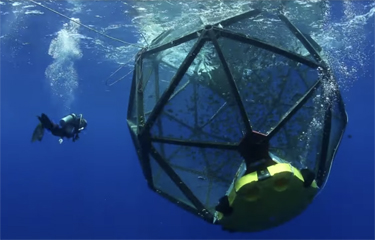Ocean Era plans species change for Florida fish farm, environmental groups cry foul

Ocean Era has filed a request with the U.S. Environmental Protection Agency to change some of its plans for its proposed offshore Velella Epsilon offshore aquaculture facility, and environmental groups have called the proposal a “bait and switch.”
Ocean Era’s Velella Epsilon project would situate an open-ocean fish farm 45 miles off the southwest coast of Sarasota, Florida, U.S.A. The original plan was to farm roughly 20,000 almaco jack – also known as kampachi – a fish native to the Gulf of Mexico, in one net-pen, as part of a pilot project.
The EPA previously issued the company a National Pollutant Discharge Elimination System (NPDES) permit on 9 June, 2022, after an initial approval in 2020 was hit with appeals that ultimately ended with the EPA’s Environmental Appeals Board rejecting the challenges and granting the permit.
Now the company is trying to change the species being farmed to red drum, and plans to change the structure of the farm itself from a swivel-point mooring system to a grid mooring system. A release from the company states the species change is based on a belief that red drum offers “much more market opportunity” in the U.S.
The market, Ocean Era said, already faces competition from three existing offshore kampachi farms, whereas red drum– typically farmed in open ponds in Texas – has faced deep freezes harming production.
“We believe that there is a lot of potential for market growth for red drum – at the moment, farmed red drum is being imported into the U.S. from as far away as Mauritius,” Ocean Era said. “We should be farming this species here, in our own waters. There are numerous hatcheries around the Gulf that are already producing red drum for stock enhancement for recreational fishing, so we can readily obtain red drum fingerlings from the same region that we will deploy the demonstration pen.”
The change in the mooring system, the company added, is a change in the number of anchors, “not a significant change in the impacts from the project.”
Opponent groups, however, are calling the two changes a “bait and switch.” Multiple opponent groups – including Food & Water Watch, Center for Food Safety, Healthy Gulf, Recirculating Farms, Sierra Club, Suncoast Waterkeeper, and Tampa Bay Waterkeeper – sent a letter to the EPA on 7 June asking the agency to void the existing permit and hold a new impact assessment and public comment period.
“Although Ocean Era self-servingly asserts that ‘[n]o appreciable changes in fish production numbers are anticipated’ and ‘[o]nly minor changes in the submersible net pen design are anticipated,’ it is incumbent on EPA to independently scrutinize the project proponent’s representations and conduct a thorough examination of any new impacts that could result from these notable changes,” the letter states.
Opponents also held a small protest in Venice, Florida, calling on the EPA to take a second look at the permitting – and to rethink permitting the project at all.
“Notwithstanding the major changes to the project proposal, this permit is flawed and not adequately protective of the environment and our coastal communities that rely on clean and healthy waters,” Suncoast Waterkeeper Founder and Board Member Justin Bloom said during the protest. “The new changes are tantamount to an entirely new project and make it clear that the permitting agencies should require a new permit proposal.”
Ocean Era CEO Neil Anthony Sims told SeafoodSource that impacts on the permit timeline are still up to the EPA and Army Corps of engineers, but added that the project has already seen plenty of reviews.
“We believe that the project has already undergone significant review, over the last 6 years,” he said. “We believe that these proposed modifications to the project are only minor, and that the impacts will continue to be seen as not significant.”
The press release from Ocean Era adds that the project is just a demonstration project with one batch of fish, to show whether or not open-ocean farming is feasible for the Gulf of Mexico.
“Why would the opponents want to prevent us from demonstrating to the Florida fishing and boating communities that there will be no negative impacts, and that there may be benefits from such an operation?” the company said. “Those that are opposed to this project seem to be willing to ignore the science on offshore aquaculture. This could be considered to be morally equivalent to climate science denial. Which side do they want to be on?”
Photo courtesy of Ocean Era






Share